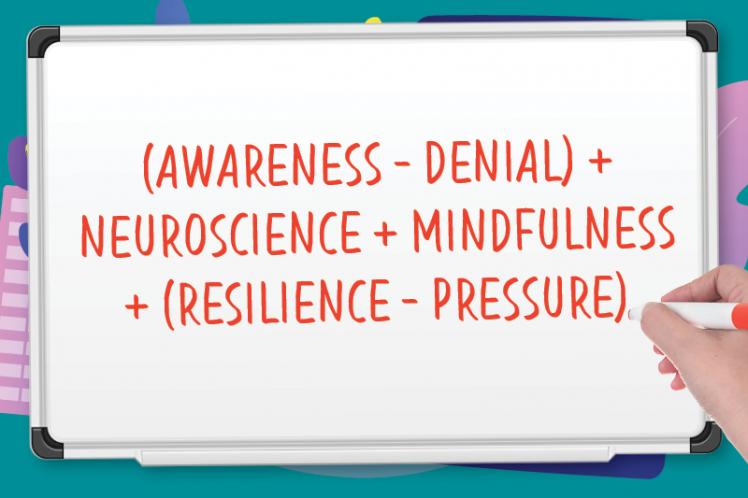The Workplace Wellbeing Formula

In 2017, mental health issues (including stress, depression, anxiety and serious conditions) resulted in 15 million work days lost. In 2018, 34% of employees indicated they have felt unwell because of work-related stress.
Employee health has always been a key concern for organizations, but in recent years the focus has shifted to mental health and workplace wellbeing, with many employers introducing a plethora of wellness initiatives.
But if you're feeling overwhelmed or stressed at work, what can you do to improve your wellbeing and restore balance?
In this article, we combine the expertise of four wellbeing authors to crack the workplace wellbeing formula.
What is wellbeing?
Wellbeing is a critical area of performance and productivity for organizations; improved wellbeing can lead to reduced sickness, increased trust and employee loyalty.
But defining wellbeing can be difficult. It includes feeling safe, comfortable, secure, happy and healthy, but there are also further psychological constructs known as Eudaimonic and Hedonic:
- Euadaimonic characteristics refer to the purposeful side of wellbeing. These are the positive ways in which we live and view life, sometimes referred to as ‘knowing yourself.’
- Hedonic is subjective wellbeing, including pleasure and happiness.
Phenomena such as presenteeism and leaveism give a far better understanding of how people feel about their work, especially in relation to how they draw meaning and purpose; critical tenets to wellbeing.
Presenteesim is the practice of being present at one's place of work for more hours than is required, especially as a manifestation of insecurity about one's job. The latest statistics from a survey of 1,078 organizations across the UK in reference to 3.2 million employees indicate that the average level of employee absence was 5.9 days per employee per year, or 2.6% of working time lost. Four fifths of respondents had observed presenteeism, with under a third taking any steps to discourage it.
In terms of leaveism, which is employees using annual leave to catch up on work, almost two thirds of respondents observed this over the previous twelve months.
The workplace wellbeing formula
Stress and anxiety are two of the biggest enemies of wellbeing. Around 23-30% of employees feel frustrated, stressed, anxious or annoyed numerous time a week, and 25% of employees frequently feel emotionally drained or exhausted after an average day’s work.
And while a little bit of stress can be good for you, prolonged periods of stress and anxiety can have a negative impact on your overall wellbeing.
However, there is no one-size-fits-all approach to improving your wellbeing. Only you can determine what feels okay for you. But if you're unsure where to start, we've created a formula to get you started:
![The workplace wellbeing formula [updated] The workplace wellbeing formula [updated]](https://kp-ecommerce-kp-aws-stage.thisisblaze.com/media/project_kp/image/kogan-page-formula-image-800x533px--1.jpg)
(Awareness - Denial) + Neuroscience + Mindfulness + (Resilience - Pressure)
Find out more about each step of the formula:
We all have good days and bad days at work, but recognizing the difference between a one-off bad day and prolonged experiences of stress and anxiety is essential for improving your wellbeing.
And yet, most of us are in denial. We insist that we’re not stressed (we’re just tired). Or even if we are stressed, we’ll be fine by tomorrow (this is known as minimization denial – when the fact is admitted, but downplayed).
The first step to achieving workplace wellbeing is to overcome your denial and becoming aware of your emotional and physical health.
Being honest with yourself and how you are feeling is essential for recognizing any stressors or negative aspects of work that are affecting your wellbeing.What’s more, it’s important to understand that you are not alone: suffered from work-related stress, depression or anxiety cases in 2016/17.
But why? At a time where we are becoming more concerned about both our own and others’ wellbeing at work, neuroscience – the study of the nervous system including the brain – can provide some insights.
Work has changed but our brains have not
Our brains and bodies have not changed that much since our ancestors were on the savannah.
Our bodies, both then and now, are designed to experience and react to surges of stress hormones (enabling us to run away from lions, or deal with a PR crisis) – but once the threat has gone away, the stress hormones should reduce.
The problem with 21st century work is that we have constant ‘threats’ which cause us to simulate stress – the commute, the constant emails and the inability to switch off – all of these triggers mean we constantly secrete high levels of the stress hormone, which neither our bodies or brains are equipped to deal with.
Work with, not against, your body
The good news is that we have more control over our bodies than we probably realize. By understanding our own brains a little better, we can understand the causes - and mitigate the effects - of stress.
Here are three things you can do to help calm the brain and boost your wellbeing when feeling stressed:
- Sleep
Awareness of the importance of sleep is finally increasing. For too many years, CEOs and celebrities have bragged about how little sleep they can get by on. However, research shows that sleep deprivation is the equivalent, cognitively, of being drunk at work.
Ensuring you get enough quality sleep each night will make a huge difference to your wellbeing. And if you don't sleep well, a 20-minute power nap during the early afternoon is beneficial (which more enlightened employers now recognize). - Laugh
Laughter is a great de-stressor to the brain and can actually boost IQ in the short term (Oswald et al). It might seem indulgent and not what you are meant to do at work, but having a laugh will reduce your stress and might boost your brainpower too. - Be kind
Chancellor et al (2017) explored the impact of asking some employees to perform acts of kindness over the course of four weeks. Both the receivers and the givers of the kind acts reported improvements in their wellbeing in the short term and the long term. E.g. two months later receivers were happier and givers were less depressed and more satisfied with their work and lives, compared with a control group.
To thrive in the 21st-century workplace, we all need to understand our brains a little better and work with that knowledge. But what else can we do?
Today’s fast-paced workplace is energizing and motivating for some, but for others it can be a cause of stress and anxiety.
Research has shown that mindfulness-based activities can have a significant impact on the management of stress and anxiety, and there is evidence to suggest that even quick mindfulness techniques can have a positive impact on cognitive ability – brain power we use to think, read, learn and concentrate.
The three following techniques are not a cure for stress and anxiety caused by work, but by taking the time for small self-directed actions, you can make a big difference to your working day.
- Wondering Walks
Get outside, take deep breaths, experience the different light, air, temperature and environment. Take a short walk (even if it's just around the car park) and notice what's around you.
You might find that your mind clears a bit as you put your attention elsewhere. The fresh air provides you with a steady supply of oxygen to increase energy levels, providing your body with more and fresher oxygen which can help to bring greater clarity to the brain. When you breathe fresh air you automatically think better compared to being inside for long periods.
“It feels good. Kinda like when you have to shut your computer down, just sometimes when it goes crazy, you shut it down and when you turn it on, it’s okay again.” – Ellen DeGeneres - Powerful Pauses
Our calendars, our inbox, our attention to our phones – all prevent us from just taking a short pause.
When things feel overwhelming, just simply stop for a minute. Move to a quieter space in you can, but push away your phone, your keyboard and any other distraction, and take a moment to breathe deeply. Pay attention to your breaths in and out, and picture a soothing scene – a beach or a forest that you love; your children or pet playing.
A few minutes of distraction-free pausing will help you to clear your mind and reflect on your emotions before you come back to your work with a fresh perspective.
“Even if you just use mindfulness to develop the capacity to pause between stimulus and response you’ll be making the difference between simply working and working brilliantly with your best self.” – Justin Standfield, Incendo Development. - Forensic Focus
At work, we can experience a barrage of interruptions – the phone ringing, people asking ‘quick’ questions etc. Becoming really conscious about what you need to do in that moment can enable you to do more and better work.
This forensic focus requires you to clear your desk of everything except the task you must complete, set a timer for how long you want to focus on it, with an alarm to tell you when to stop, and then prepare yourself - get what you need, and tell your boss or colleague what you’re going to do. Remind yourself what you need to do and why you need to do it – think about what a good outcome looks like in the time allocated. If you can, find the best working environment for you – a quiet room, headphones on, a drink - and press start on the timer.
You may find yourself distracted now and again, but remind yourself of your time limit, and the end goal. You’ll be amazed how much more you can achieve in that focussed window!
“It is during our darkest moments that we must focus to see the light.” - Aristotle
Many of the pressures and expectations we experience at work are imposed by clients, stakeholders or colleagues, but probably the greatest pressure and expectation is that which we demand of ourselves.
Our reaction to these pressures can change according to our state of mind, our physical well-being and whether this is the first or a repeat experience. Resilience is not fixed and we can find ourselves more or less vulnerable at different points.
How then can we thrive at work? The following techniques can help to alleviate pressure and build emotional resilience:
- Stop working (all the time!)
Working constantly without taking care of yourself, your relationships and outside interests is unhealthy and unproductive. A constant state of business has become the norm and this is leading to more cases of burnout; our incessant activity is limiting our creativity (Cohen, 2018). The brain cannot operate at peak performance for long periods of time and interspersing focused work periods with rest, relaxation and exercise helps us to perform well and protects our wellbeing.
So, be unapologetic about taking a lunch break, and remember that you need longer periods of rest (i.e. a holiday) to properly recharge and restore yourself. If you are a manager, it is important to reinforce this message to your team. - Remember your strengths
There are times when we may feel inadequate or inferior; we worry that we have not performed well and that we are somehow deficient. This self-perception can be hard to shift, but flourishing in the workplace requires us to be more gentle with ourselves.
You should consider your own actions and capabilities with the kindness and generosity that you would offer to a colleague or a new recruit. Do not deny your strengths and talents, and learn to recognize the benefits of your so-called faults. For example, instead of seeing introversion as a weakness, consider yourself a master of observation. Improved self-image will reduce negativity and lead to greater joy and productivity at work. - Keep learning
Nothing is accomplished without courage. Be prepared to make mistakes, and forgive yourself. Learning from challenges and difficult experiences will lead to both personal and professional growth and development. I follow the simple practice of writing down three things I have learnt at the end of each day - watching this journal grow reminds me of how much I have progressed.
Next steps
While these tips and techniques serve as a good starting place, you should aim to seek professional guidance from your employer and/or GP if you are experiencing long-term workplace wellbeing issues.
Make sure you understand your rights and what your employer is legally obliged to provide (see Your Health at Work).
Helpful links:
https://www.nhs.uk/conditions/stress-anxiety-depression/mental-health-helplines/
https://www.nhsinform.scot/illnesses-and-conditions/mental-health











